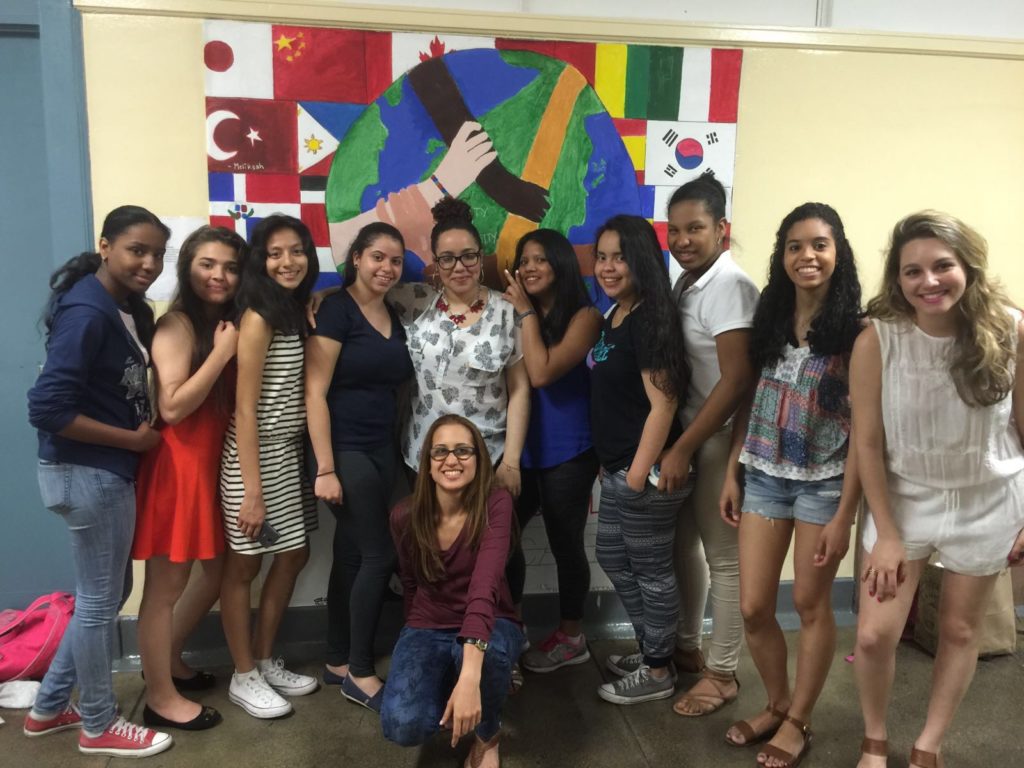This article is part of the special editorial section called “Mentors4Teens,” which highlights positive influence to our teens thru mentors beyond mom and dad. Channel is sponsored by Ford en Español, and their #AbrochatePorAmor campaign for safe teen driving.

Young Latinas of the L.O.V.E Mentoring Program in NYC.
We had the opportunity to chat with Claudia Espinosa, founder of L.O.V.E., a mentoring program for young Latinas in NYC.
Claudia knows a thing or two about mentoring tweens and tweens, as her program has empowered hundreds of young girls, thanks to her partnerships with local schools.
We recommend: Q&A with Claudia Espinosa, Founder of L.O.V.E. Mentoring Program for Young Latinas in New York
If your child isn’t exposed to a structured mentoring program like L.O.V.E., there’s ways you can add a mentor (other than yourself) to be a positive example for their transition into adulthood.
Finding Mentors within the Family
Within the family, mom and dad are seen as the authoritative figures, so looking for a family member outside parents, can make a more open mentoring relationship, like an aunt or causing that your teen looks up to. A mentor should be asking “How you are doing, How you feel?” instead of “You must do this, or is better if you not do this….” Asking versus telling.
We recommend: 4 maneras que influyo positivamente a mis sobrinos como una P.A.N.K (“Profesional Aunt, No Kids”)
Finding Mentors in Local Programs
To look for role models outside the family, look into your local non-profit organizations. First, decide what kind of support your teen can benefit from: navigating high school, preparing for college, working on their self-esteem, and then do online research. This may be a little daunting if you don’t feel tech savvy, but if you don’t know of someone in the family to support you with the research, ask help in the local library.
We recommend: “Blossom Camp” Makes Miami Debut as Holistic Summer Camp for Tween Girls
Finding Mentors in Schools
For many under-resourced parents, their first resource is the school. Schools are very interested in having external resources for their students. Perhaps in the underserved areas is a little more difficult, as the students have other problems at home that the school may not know of. In New York City they have created community schools with community organizations, and the city has extra resources for both public and private schools. My experience is that schools in general want to support as their job is never enough. When I go to schools and talk about partnering, they are open because they can never say “we are good.”
The best way to start is to speak with the teacher, principals, or counselors and ask for support. If you don’t ask it, they won’t know what’s needed. Also if parents go to school and they don’t have the resources, schools can tell them where to go.
Tips for Mentors
When we talk with teens, we may think we know the answers, but the best way to help them is to explain the benefits of not doing or doing something. Start by giving them a big picture explanation and focus on the WHY. Speak at their level!
For example, tell them that that consequences of not doing homework would be that he/she won’t graduate on time, and then do the career they want….instead of just saying “you will get an F grade.” Walk them through the small steps in order to get to the big picture. Also, make it easier to relate to them by asking open-ended questions.
If you are in NYC and would like to get involved in L.O.V.E. Mentoring Program for Young Latinas, fill out this mentor application.
Anllelic Lozada “Angie” is a proud P.A.N.K (professional aunt with no kids), a Personal Marketing Strategist in NYC and Los Tweens & Teens “Tia-in-Charge,” based in New York City. Anllelic wants you to best your best life so you can positively influence your tween and teen. Subscribe to her weekly e-newsletter in Spanish in marketingparatucarrera.com/Vendete, where she shares personal marketing strategies to help you “Comunicar lo genial que eres.”
